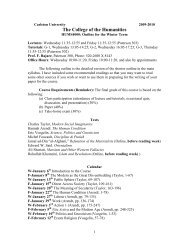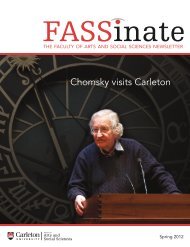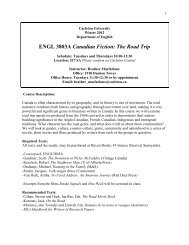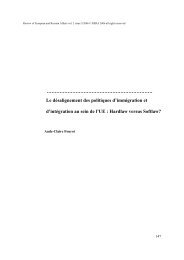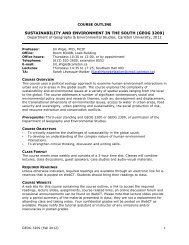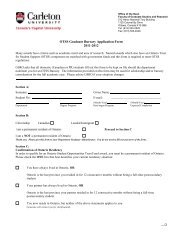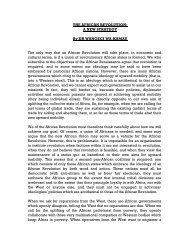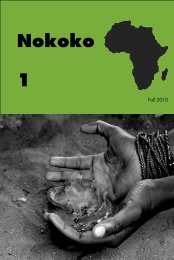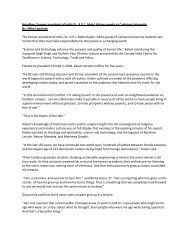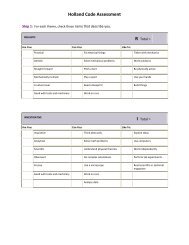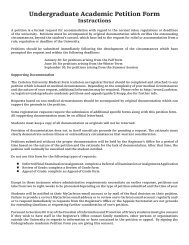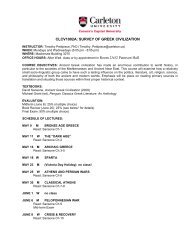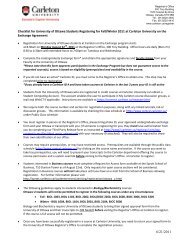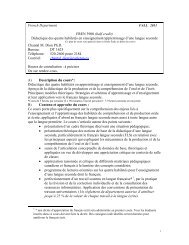Notes on writing a History essay - Carleton University
Notes on writing a History essay - Carleton University
Notes on writing a History essay - Carleton University
You also want an ePaper? Increase the reach of your titles
YUMPU automatically turns print PDFs into web optimized ePapers that Google loves.
<str<strong>on</strong>g>Notes</str<strong>on</strong>g> <strong>on</strong> <strong>writing</strong> a <strong>History</strong> <strong>essay</strong><br />
These are general guidelines for <strong>writing</strong> <strong>essay</strong>s in the Department of <strong>History</strong>. You should ensure that your<br />
instructor does not have specific requirements that differ from those set out here.<br />
What is a <strong>History</strong> <strong>essay</strong><br />
Instructors assign <strong>essay</strong>s to give you the opportunity to study a specific subject and to develop c<strong>on</strong>clusi<strong>on</strong>s<br />
of your own about it. The main objects of the exercise are to get you to think about the subject and to reach<br />
c<strong>on</strong>clusi<strong>on</strong>s based <strong>on</strong> relevant evidence and the creati<strong>on</strong> of a logical argument.<br />
Essay topics are generally framed as questi<strong>on</strong>s to be answered or problems to be analyzed. For example, the<br />
<strong>essay</strong> topic “Assess the relative importance of political and ec<strong>on</strong>omic factors in the origins of the French<br />
Revoluti<strong>on</strong>” asks you to decide which were more important in explaining the outbreak of the Revoluti<strong>on</strong>:<br />
political factors or ec<strong>on</strong>omic factors. Some instructors may ask you to devise your own <strong>essay</strong> topic to give<br />
you an opportunity to study a problem you find particularly interesting. It is important to frame your topic<br />
as a questi<strong>on</strong> or problem so that you do not write an <strong>essay</strong> that is simply descriptive or a narrative of events.<br />
There is no single "right answer" to any questi<strong>on</strong> posed in an <strong>essay</strong> assignment in <strong>History</strong>. The<br />
c<strong>on</strong>clusi<strong>on</strong>s you come to might be judged more or less "right." What is important is not <strong>on</strong>ly the c<strong>on</strong>clusi<strong>on</strong><br />
you reach but also the evidence and arguments you use to support it. In the example of the <strong>essay</strong> <strong>on</strong> the<br />
French Revoluti<strong>on</strong>, you could make a case that (a) political factors were more important than ec<strong>on</strong>omic, (b)<br />
ec<strong>on</strong>omic factors were more important than political, (c) political and ec<strong>on</strong>omic factors were so closely<br />
c<strong>on</strong>nected that it is impossible to discuss them separately, or (d) other factors (such as social) were more<br />
important than either political or ec<strong>on</strong>omic. The evidence you collect will lead you to <strong>on</strong>e of these<br />
c<strong>on</strong>clusi<strong>on</strong>s.<br />
Although there is no single "right answer" to a questi<strong>on</strong> in <strong>History</strong>, there are "wr<strong>on</strong>g answers." You could<br />
not successfully argue, for example, that political or ec<strong>on</strong>omic factors were totally irrelevant to the origins<br />
of the French Revoluti<strong>on</strong> and that the Revoluti<strong>on</strong> was caused by a particular c<strong>on</strong>juncti<strong>on</strong> of the stars and<br />
planets.<br />
The important thing to remember is that you are asked to assess evidence and to present an informed<br />
point of view, not merely to give an opini<strong>on</strong>. Reaching c<strong>on</strong>clusi<strong>on</strong>s in <strong>History</strong> is not the same as having<br />
an opini<strong>on</strong> about a movie or whether apples taste better than oranges. Historians use agreed-up<strong>on</strong> rules of<br />
evidence and argument. They select informati<strong>on</strong> relevant to the problem they are analyzing, they apply the<br />
evidence fairly, and they argue logically. They do not decide <strong>on</strong> a c<strong>on</strong>clusi<strong>on</strong> in advance and then present<br />
<strong>on</strong>ly the evidence that supports it while c<strong>on</strong>cealing evidence that c<strong>on</strong>tradicts it.<br />
When you write an <strong>essay</strong> you are required to practice the same rules as professi<strong>on</strong>al historians: to collect<br />
all relevant evidence, assess it fairly, and use it to c<strong>on</strong>struct a logical argument with a c<strong>on</strong>clusi<strong>on</strong> that<br />
expresses the weight of the evidence. If you were <strong>writing</strong> the <strong>essay</strong> <strong>on</strong> the origins of the French Revoluti<strong>on</strong><br />
you would find some historians arguing that political factors were most important while others argued for the<br />
primacy of ec<strong>on</strong>omic factors. As you read their respective works, weigh up their arguments. Even though<br />
you might find each side has valid points you will probably find that, overall, <strong>on</strong>e side has a str<strong>on</strong>ger case.<br />
Do not try to guess which argument or c<strong>on</strong>clusi<strong>on</strong> your instructor favours and then write an <strong>essay</strong> that<br />
supports his or her positi<strong>on</strong>. Nor should you simply repeat the views expressed in the books and articles you<br />
have read while preparing the <strong>essay</strong>. Your instructor already knows what those authors have written and she<br />
or he wants to read your argument and c<strong>on</strong>clusi<strong>on</strong>.
2<br />
Do not be put off by the fact that historians do not always agree. It is very easy to throw up your hands and<br />
think, "If professi<strong>on</strong>al historians can*t decide, how can I" But the fact that professi<strong>on</strong>al commentators and<br />
journalists disagree <strong>on</strong> how to interpret current events does not stop you from having a point of view <strong>on</strong><br />
politics, and neither should you be deterred from reaching a c<strong>on</strong>clusi<strong>on</strong> in a <strong>History</strong> <strong>essay</strong> because historians<br />
disagree. It is part of your academic training to assess the validity of arguments without being overwhelmed<br />
by the judgments of others.<br />
Much more important than references to professi<strong>on</strong>al historians is your own judgment, as l<strong>on</strong>g as it<br />
is supported by the evidence. Your <strong>essay</strong> should dem<strong>on</strong>strate a range of factual evidence. You should also<br />
show that you are aware of alternative c<strong>on</strong>clusi<strong>on</strong>s to the <strong>on</strong>e you have adopted and you should explain why<br />
you have rejected them. There is no need to be dogmatic in stating your c<strong>on</strong>clusi<strong>on</strong>. Do not be afraid to use<br />
words like "probably" or "apparently" to indicate that you wish to qualify or nuance it.<br />
You must be very careful to set out the argument (or "thesis") of your <strong>essay</strong>, usually in your introducti<strong>on</strong>.<br />
<strong>History</strong> often seems to be a story, a sequence of events or "narrative," and it is all too easy to fall into the trap<br />
of <strong>writing</strong> an <strong>essay</strong> that is no more than a recounting of a series of events with a brief opini<strong>on</strong> tacked <strong>on</strong> at<br />
the end. It is important to remember that a <strong>History</strong> <strong>essay</strong> is an exercise in developing a str<strong>on</strong>g argument and<br />
an interpretive positi<strong>on</strong> based <strong>on</strong> the fair use of solid and relevant evidence. In the French Revoluti<strong>on</strong> <strong>essay</strong>,<br />
for example, it would be useless to give a narrative account of the origins of the Revoluti<strong>on</strong> that did not<br />
explicitly weigh political and ec<strong>on</strong>omic factors. You might occasi<strong>on</strong>ally need to provide a narrative of a<br />
little-known or c<strong>on</strong>troversial sequence of events, but this would usually be d<strong>on</strong>e in order to provide material<br />
for analysis.<br />
The process of <strong>writing</strong> an <strong>essay</strong><br />
Writers write in many different ways. Some discipline themselves to write so many words a day while others<br />
wait for "inspirati<strong>on</strong>." Some do all their research before they start <strong>writing</strong> while others begin to write while<br />
they are still doing research. You will find your own style and method, but some general rules for <strong>essay</strong><strong>writing</strong><br />
at the undergraduate level are pretty universal, especially given that you have to meet a deadline.<br />
The first thing is to know what your <strong>essay</strong> is about. This seems obvious but often students fail to read the<br />
<strong>essay</strong> questi<strong>on</strong> carefully. A poor understanding of the topic will almost certainly lead you to write a poor<br />
<strong>essay</strong>. Re-read the questi<strong>on</strong> or topic carefully before you start your research, again before you begin to write,<br />
and a third time when re-reading your first draft. If you have any doubt about what the topic involves, ask<br />
your instructor before you start work <strong>on</strong> the <strong>essay</strong>.<br />
It is best to start your research with some general background reading before you begin to c<strong>on</strong>sider the<br />
specific topic. This will familiarize you with the general subject and allow you to put the more detailed<br />
informati<strong>on</strong> in a broader c<strong>on</strong>text. If you were <strong>writing</strong> <strong>on</strong> the origins of the French Revoluti<strong>on</strong>, start with a<br />
textbook and read the chapter <strong>on</strong> the background to the Revoluti<strong>on</strong>. Then move to the more specialized<br />
sources, taking careful notes <strong>on</strong> any material you feel might be relevant. Note the source and page reference<br />
for the notes you make. This will save you the time and trouble of tracking down references later. Be<br />
particularly careful when you copy material you might want to quote. Always use quotati<strong>on</strong> marks around<br />
material you copy directly from your sources. If you c<strong>on</strong>fuse your own notes with direct quotati<strong>on</strong>s you<br />
might inadvertently commit plagiarism (discussed below).<br />
Devise a system of organizing your notes that you find sensible and appropriate to the topic or the length of<br />
the paper. You might take notes <strong>on</strong> file cards, using a new card for each topic. Alternatively you might use<br />
a separate sheet of paper for each source you c<strong>on</strong>sult. You can then devise a method for marking separate<br />
topics <strong>on</strong> each sheet. Over time you will develop the system you find most successful.<br />
Do not worry if you seem to be making a lot of notes. It is better to have more material than you need than
3<br />
to discover too late that you have too little. By the same token, do not feel compelled to use every note you<br />
have made. When <strong>writing</strong> an <strong>essay</strong> it is just as important to know what to leave out as what to put in. You<br />
might find that some informati<strong>on</strong> that seemed important when you took notes turned out to be irrelevant or<br />
marginal. Use <strong>on</strong>ly what you really need to support your argument.<br />
While doing the research, remember that you are interested in both the factual informati<strong>on</strong> c<strong>on</strong>tained in your<br />
sources and the interpretati<strong>on</strong>s of the various writers. Read carefully and critically so that you learn to<br />
distinguish these two elements, and keep track of them separately in your notes. Try to be aware of the<br />
approach or bias of the works you read. The introducti<strong>on</strong> to a book will generally give you an indicati<strong>on</strong> of<br />
its author's approach, such as whether she or he believes that the subject is best explained by ec<strong>on</strong>omic or by<br />
political c<strong>on</strong>diti<strong>on</strong>s.<br />
Planning your <strong>essay</strong><br />
Plan the <strong>essay</strong> before you begin to write. Never attempt to write an <strong>essay</strong> "off the top of your head." Your<br />
reader will quickly recognize a poorly organized <strong>essay</strong>.<br />
The first step is to re-read all your notes to remind yourself of the data you have collected. You should then<br />
decide <strong>on</strong> the major points and what your overall argument or thesis will be. Organize the material that<br />
supports your argument or illustrates the major points. If you find that you are missing evidence for a specific<br />
point, go back to the books and articles you used or locate new <strong>on</strong>es and do some more research.<br />
Ask yourself if your research has uncovered any c<strong>on</strong>flicting points of view. Decide how you want to handle<br />
these ideas. You might present the reader with a synthesis of them, you might discuss each separately, or you<br />
might simply choose to present the argument which you found most c<strong>on</strong>vincing.<br />
Choose an organizati<strong>on</strong>al scheme. Is it more appropriate to approach the topic chr<strong>on</strong>ologically or<br />
thematically Would a comparis<strong>on</strong> be helpful If you are presenting a complex argument, make sure the<br />
points are made in a logical way. In what order should your points be made Which themes should receive<br />
the most attenti<strong>on</strong><br />
Then write the outline. Use point form to list your main ideas, with headings and subheadings as appropriate.<br />
State your thesis at the beginning of the outline and make sure that the points you make support it. One<br />
effective strategy is to place your most important points first and last where they will have the most impact<br />
<strong>on</strong> the reader. Errors in logical progressi<strong>on</strong> or awkward changes of topic will appear more clearly in an<br />
outline, so take time to c<strong>on</strong>sider what you have written. Some instructors will look over your <strong>essay</strong> outline<br />
if you have it ready well before the deadline.<br />
Writing your <strong>essay</strong><br />
If you have prepared a good outline, <strong>writing</strong> the <strong>essay</strong> might involve not much more than filling out the points<br />
you have set down. Writing generally takes l<strong>on</strong>ger than you anticipate, however, and you should not leave<br />
it to the last minute so that you have no choice but to submit the first draft as your finished <strong>essay</strong>.<br />
Your <strong>essay</strong> should have an introducti<strong>on</strong>, body, and c<strong>on</strong>clusi<strong>on</strong>. The introducti<strong>on</strong> should set out your<br />
argument and provide other informati<strong>on</strong> that will help the reader. For example, it might include a reference<br />
to a debate am<strong>on</strong>g historians or point out that you have used a particular or unusual source. The body of the<br />
<strong>essay</strong> sets out your specific arguments with supporting evidence and illustrati<strong>on</strong>s. In general each paragraph<br />
should c<strong>on</strong>tain <strong>on</strong>e major point or illustrati<strong>on</strong>. In the c<strong>on</strong>clusi<strong>on</strong> you should summarize your argument.<br />
When the first draft is finished, read it over using the following checklist:<br />
• Have you made your intenti<strong>on</strong>s and your thesis clear to the reader<br />
• Have you defined all important terms
4<br />
• Have you included any irrelevant or unnecessary material Have you repeated yourself<br />
• Have you forgotten any important points<br />
• Have you checked the spelling, punctuati<strong>on</strong> and grammar, particularly in areas where you are<br />
uncertain<br />
• Have you provided footnotes where necessary, and are your footnotes or endnotes complete and<br />
accurate If in doubt verify the references in the original sources.<br />
• Is the <strong>essay</strong> the right length as set by your instructor<br />
• Have you prepared a complete and accurate bibliography<br />
Never write <strong>on</strong>ly <strong>on</strong>e draft. The most experienced and brilliant writers go through several revisi<strong>on</strong>s before<br />
their work is ready for others to read. It is often very helpful to put the first draft aside for a day or two.<br />
Looking at it with a fresh perspective will help you spot weaknesses in organizati<strong>on</strong> and c<strong>on</strong>tent.<br />
After typing or printing the finished paper, proofread the paper <strong>on</strong>e final time before submitting it. This<br />
is essential even if you use a computer that checks spelling because the computer will not tell you when you<br />
have c<strong>on</strong>fused <strong>on</strong>e correctly-spelled word with another. It will let you write "He went their" and "They were<br />
not aloud to go." It is difficult to proofread your own work and you might ask a friend to check your <strong>essay</strong><br />
for errors in spelling, grammar, and the format of your notes and bibliography.<br />
Style<br />
Writing is an art and there are no rigid formulas or rules when it comes to style. Your pers<strong>on</strong>al <strong>writing</strong> style<br />
will develop with practice. There are, however, rules of grammar and punctuati<strong>on</strong> that must be observed in<br />
order to make your meaning clear.<br />
It is better not to use too many direct quotati<strong>on</strong>s. Use your own words wherever possible, and save quotati<strong>on</strong>s<br />
for special emphasis or when the author expresses an idea in a particularly effective way which you yourself<br />
cannot match.<br />
Avoid using colloquial expressi<strong>on</strong>s, clichés or jarg<strong>on</strong> in <strong>essay</strong>s. Do not use c<strong>on</strong>tracti<strong>on</strong>s (d<strong>on</strong>'t, gov't) or<br />
abbreviati<strong>on</strong>s (Main St.).<br />
Do not use the first pers<strong>on</strong> if at all possible in a formal <strong>essay</strong>. Instead of saying "I think that...," simply state<br />
your point of view.<br />
Keep all the verbs in the same tense. Do not switch back and forth between past and present tense unless you<br />
are <strong>writing</strong> to achieve a specific effect in a work of ficti<strong>on</strong> or casual journalism. <strong>History</strong> <strong>essay</strong>s are usually<br />
written in the past tense.<br />
Remember that good <strong>writing</strong> is essential to win and keep your reader's attenti<strong>on</strong>. Write clearly and directly.<br />
No <strong>on</strong>e is impressed by jarg<strong>on</strong>, by improperly used multi-syllabic words, or by complicated sentence<br />
structure. Make your sentences as straightforward as possible, but try to vary their length and structure to<br />
keep the reader interested. The active voice (e.g., "The king declared war") is more effective than the passive<br />
voice (e.g., "War was declared by the king").<br />
Avoiding plagiarism<br />
Do not paste together an <strong>essay</strong> simply by linking a series of excerpts from <strong>on</strong>e or more books. Believe it or<br />
not, it is actually more difficult to write an <strong>essay</strong> this way than it is to write a proper <strong>on</strong>e.
5<br />
Do not copy phrases, sentences or entire passages from your sources unless you are deliberately using a direct<br />
quotati<strong>on</strong>. The <strong>University</strong> has severe penalties for plagiarism and the Department of <strong>History</strong> has issued the<br />
following policy:<br />
All written work for... every <strong>History</strong> course must be untainted by plagiarism. The <strong>University</strong> Senate<br />
defines plagiarism as “to use and pass off as <strong>on</strong>e*s own idea or product the work of another without<br />
expressly giving credit to another.” (Calendar, p. 50) The Department of <strong>History</strong> interprets this statement<br />
as covering the following practices:<br />
C Copying from another pers<strong>on</strong>'s work without indicating this through appropriate use of quotati<strong>on</strong><br />
marks andcitati<strong>on</strong>s in footnotes.<br />
C Lengthy and close paraphrasing of another pers<strong>on</strong>'s work (i.e., extensive copying interspersed with<br />
a few "different" phrases or sentences.<br />
C Submitting written work produced by some<strong>on</strong>e else as if it were <strong>on</strong>e's own work (e.g. another<br />
student's term paper, a paper purchased from a commercial term paper "factory," material<br />
downloaded via the Internet, etc.).<br />
In an academic envir<strong>on</strong>ment plagiarism is a serious offence, and it is not a matter that can be dealt with by<br />
an informal arrangement between the student and the instructor. In all cases where plagiarism is suspected,<br />
instructors are now required to notify their departmental Chair, and the Chair is in turn required to report the<br />
matter to the Associate Dean of the Faculty. The Associate Dean makes a formal investigati<strong>on</strong> and then<br />
decides <strong>on</strong> an appropriate sancti<strong>on</strong>. Penalties can range from a mark of zero for the plagiarized work, to a<br />
final grade of F for the course, to suspensi<strong>on</strong> from all studies, to expulsi<strong>on</strong> from the <strong>University</strong>. (Students<br />
should also be aware that the Senate classifies as an instructi<strong>on</strong>al offence the submissi<strong>on</strong> of "substantially<br />
the same piece of work to two or more courses without the prior written permissi<strong>on</strong> of the instructors...<br />
involved.")<br />
Some technical points<br />
Essays must be typed or printed unless your instructor indicates otherwise. Use double-spacing, with adequate<br />
margins <strong>on</strong> all four sides of the text. Be sure to number the pages.<br />
Quotati<strong>on</strong>s that are l<strong>on</strong>ger than four lines should be single spaced and indented to set them off from the rest<br />
of the text. Do not use quotati<strong>on</strong> marks in these cases.<br />
<str<strong>on</strong>g>Notes</str<strong>on</strong>g> may be placed <strong>on</strong> separate pages at the end of the <strong>essay</strong> (endnotes), or at the bottom ("foot") of the<br />
appropriate page (footnotes). Ask your instructor for his or her preference.<br />
The bibliography must appear <strong>on</strong> a separate page or pages.<br />
The cover page must show your name, student number, date submitted, the instructor's (or tutor*s) name, and<br />
the title of the paper. Ask your instructor if you should use the exact title that was assigned to you or whether<br />
you yourself should devise a title. If you give your <strong>essay</strong> your own title, it should be clear and descriptive<br />
so that the reader knows immediately what the <strong>essay</strong> is about.<br />
Footnotes/endnotes<br />
Footnotes or endnotes are generally used to identify direct quotati<strong>on</strong>s from your sources, ideas and<br />
interpretati<strong>on</strong>s that are not your own, little-known facts, and informati<strong>on</strong> likely to be c<strong>on</strong>troversial. You<br />
should not footnote a well-known fact such as "The French Revoluti<strong>on</strong> began in 1789," but you should
6<br />
footnote a more obscure fact such as "In 1789 French army officers had to swear an oath not to order their<br />
troops against civilians."<br />
You will probably find that most paragraphs (except for the introducti<strong>on</strong> and c<strong>on</strong>clusi<strong>on</strong>) have at least <strong>on</strong>e<br />
footnote. Footnotes are also useful in that they enable your reader to go to the sources you have used. You<br />
may also use a footnote or endnote if you want to comment <strong>on</strong> a point in the text without interrupting the flow<br />
of your argument. It is important that your notes are complete and accurate.<br />
If you are unsure whether or not to use a footnote in a particular case, c<strong>on</strong>sult your instructor. If you think<br />
that failing to provide a footnote might open you to a charge of plagiarism it is better to provide <strong>on</strong>e.<br />
Unless your instructor directs otherwise, do not use the Social Science form of references that gives the<br />
author, date of the publicati<strong>on</strong>, and page number in parentheses, such as: (Wils<strong>on</strong>, 1994: 35).<br />
The number indicating a note is always placed at the end of the phrase or sentence to which it refers, and it<br />
should be slightly elevated above the line of text.<br />
Titles of books and journals must be underlined. Titles of articles in journals or <strong>essay</strong>s c<strong>on</strong>tained in books<br />
are enclosed in quotati<strong>on</strong> marks. An example of a note referring to a passage in a book is:<br />
3<br />
G.L. Nute, Caesars of the Wilderness (New York, 1943), pp. 70-72.<br />
An example of a note referring to a passage in an article is:<br />
6<br />
Robert Lynd, "Objecti<strong>on</strong>s to Laughter," Atlantic M<strong>on</strong>thly, 145 (March, 1930), p. 334.<br />
There are some shortcuts. If you have two c<strong>on</strong>secutive references to the same source, use ibid., which is the<br />
abbreviati<strong>on</strong> of the Latin word "ibidem," meaning "in the same place." For example:<br />
3<br />
G.L. Nute, Caesars of the Wilderness (New York, 1943), p. 60.<br />
4 Ibid., p. 95.<br />
If a reference is repeated after <strong>on</strong>e or more references have intervened, you may either abbreviate the sec<strong>on</strong>d<br />
reference or use op. cit., the abbreviati<strong>on</strong> for the Latin words "opere citato," meaning "in the work already<br />
cited." For example,<br />
7 Nute, p. 30.<br />
7 Nute, op. cit., p. 30.<br />
If you have used two or more sources by the same author make sure your reader can distinguish between them<br />
by including a word or two from the title. For example, if you used William Doyle's Origins of the French<br />
Revoluti<strong>on</strong> and his Oxford <strong>History</strong> of the French Revoluti<strong>on</strong>, you might differentiate them in the notes by<br />
citing <strong>on</strong>e as Doyle, Origins, p. 98, and the other as Doyle, Oxford <strong>History</strong>, p.112.<br />
The bibliography<br />
The bibliography is a list of the books and articles you actually c<strong>on</strong>sulted while preparing your <strong>essay</strong>, whether<br />
or not you quoted from them. Do not include encyclopedias and dicti<strong>on</strong>aries unless they specifically<br />
addressed the <strong>essay</strong> questi<strong>on</strong>. In an <strong>essay</strong> <strong>on</strong> the French Revoluti<strong>on</strong> you should not include the Encyclopedia<br />
Britannica, but you might include the Dicti<strong>on</strong>ary of the French Revoluti<strong>on</strong>. Do not include books you have<br />
not read or that you found not relevant or useful. Your instructor will quickly recognize a "padded"<br />
bibliography.
7<br />
The bibliography should appear <strong>on</strong> a separate page at the end of the <strong>essay</strong>. You should list the entries<br />
alphabetically by the author's surname and it is comm<strong>on</strong> to give the surname first. Note that bibliographical<br />
entries c<strong>on</strong>tain more informati<strong>on</strong> than references in footnotes or endnotes, and that the punctuati<strong>on</strong> is<br />
different. There are several accepted forms of punctuati<strong>on</strong>, including these:<br />
Jacks<strong>on</strong>, L.B. and A. Strake. "New Light <strong>on</strong> the Ancestry of Sydney Lanier", Virginia Magazine of<br />
<strong>History</strong> and Biography, XLII (1935), 153-170.<br />
Ormsby, W.G. The Emergence of the Federal C<strong>on</strong>cept in Canada, 1839-45. Tor<strong>on</strong>to: <strong>University</strong> of<br />
Tor<strong>on</strong>to Press, 1969.<br />
Further help in <strong>writing</strong> <strong>essay</strong>s<br />
There are many guides and handbooks <strong>on</strong> <strong>essay</strong>-<strong>writing</strong>, style, and grammar. Am<strong>on</strong>g the most useful are:<br />
Mark Hillstern, et al., The <strong>History</strong> Student Writer's Manual. Upper Saddle River: Prentice Hall, 1998.<br />
Margot Northey, Making Sense. A Student's Guide to Writing and Style. 3rd. edn., Tor<strong>on</strong>to: Oxford<br />
<strong>University</strong> Press, 1993.<br />
Kate Turabian, A Manual for Writers of Term Papers, Theses and Dissertati<strong>on</strong>s. 6th edn., Chicago:<br />
<strong>University</strong> of Chicago Press, 1996.<br />
William Strunk and E. B. White, The Elements of Style. 3rd. edn., New York: Macmillan, 1979.<br />
Students who want assistance with <strong>essay</strong>-<strong>writing</strong> can also c<strong>on</strong>tact the Writing Tutorial Service in Paters<strong>on</strong><br />
Hall 215. It offers help with all stages of <strong>essay</strong>-<strong>writing</strong> and provides <strong>on</strong>e-to-<strong>on</strong>e tutoring, free of charge, to<br />
any student registered at Carlet<strong>on</strong>. Call 520-6632 for an appointment.<br />
Use of Internet<br />
The Internet c<strong>on</strong>tains a vast amount of informati<strong>on</strong> — some valuable; some unreliable. Please be sure to<br />
check with your instructor before using the Internet as a research source.
Carlet<strong>on</strong> <strong>University</strong><br />
Department of <strong>History</strong><br />
NOTES ON WRITING A HISTORY ESSAY



